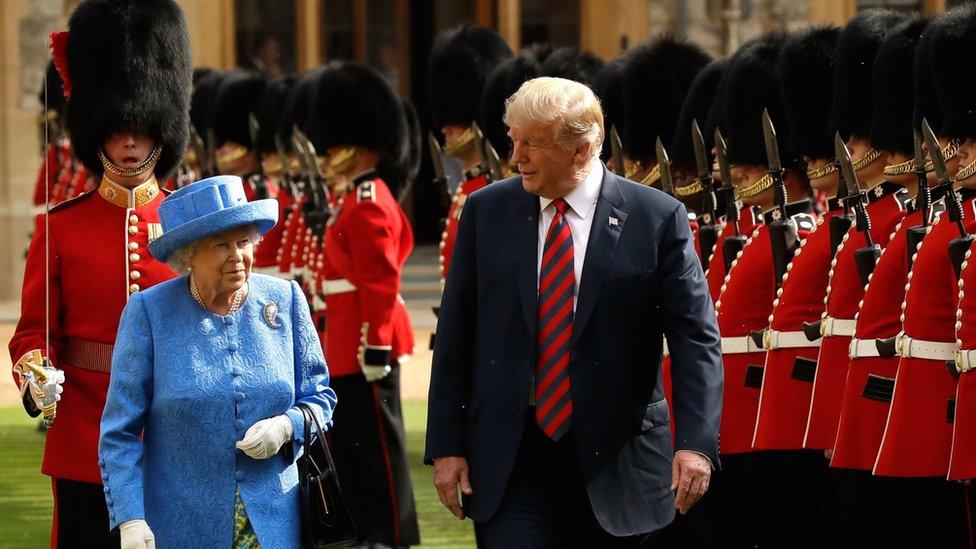Donald Trump's UK visit: Five potential diplomatic flashpoints
- Published
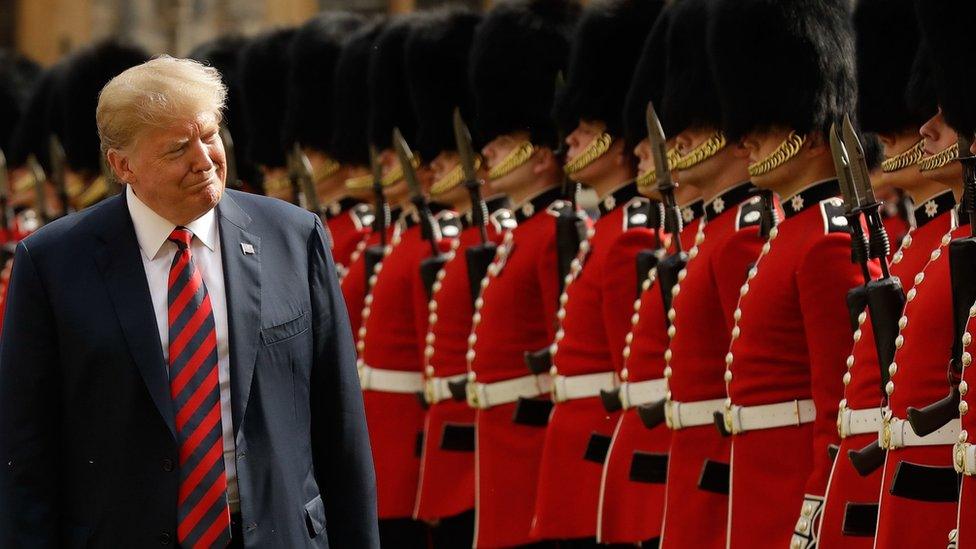
Donald Trump is making a much-delayed state visit to Britain this week.
Over three days the US president will be hosted by royalty and politicians. He will also take part in commemorations to mark the 75th anniversary of the D-Day landings.
But behind the pageantry lie policy differences that divide Britain and the United States.
Royalty
State visits are primarily royal affairs, with the emphasis as much on ceremony as politics. But even so, the potential for slip-ups is huge.
Donald Trump made a mistake last year when he turned his back on the Queen and walked in front of her while inspecting the guard at Windsor Castle.
This time there will be the tricky moment when he gives a speech at the state banquet at Buckingham Palace. Will he address the Queen correctly? Recently the White House mistakenly referred to her as "Her Royal Majesty". (Those who deal regularly with royalty would know that it should just be "Her Majesty").
Will Mr Trump continue speaking during the National Anthem, as President Obama did in 2011?
When Mr Trump has tea with the Prince of Wales at Clarence House, will they manage to avoid airing their rather different views on climate change?
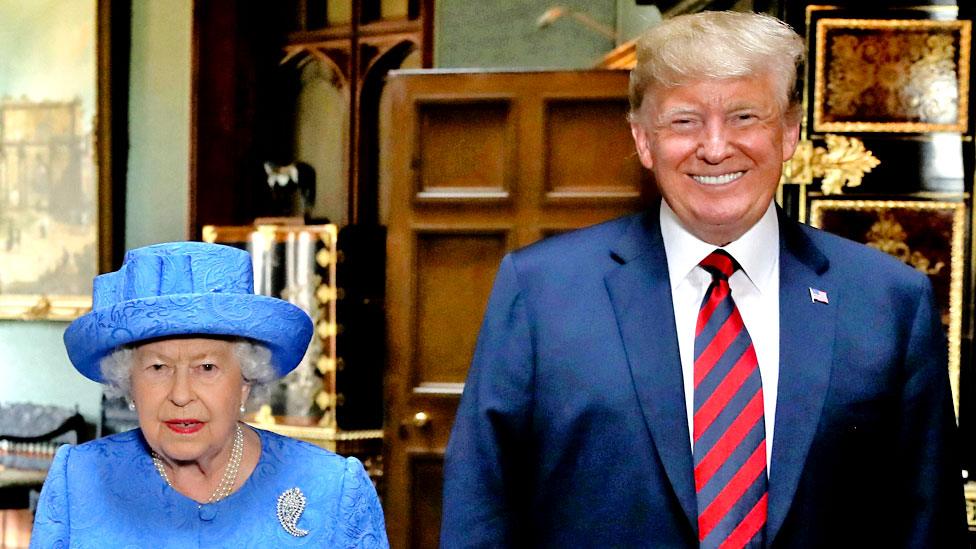
Mr Trump met the Queen when he visited the UK last year
The president has no incentive to mess things up - he clearly likes the pomp and pageantry of royalty and will want the pictures to look good back home ahead of his re-election campaign. But there remains the question of how much advice he will take from his protocol team.
The biggest potential flashpoint - in theory - could be the Duchess of Sussex who, in her past, pre-regal life, expressed opposition to Mr Trump's views. The US president told The Sun newspaper, external he was surprised Meghan had been so "nasty" about him.
Perhaps fortuitously, the Duchess is still on maternity leave and will play no part in the visit.
But it will not have gone unnoticed that an American citizen who only recently married into the British royal family - and thus epitomizes the close relationship between both countries - will not be part of the team welcoming her president to these shores.
Brexit
Mr Trump's visit comes at a tricky time politically for Britain. He will be visiting the lamest of lame duck prime ministers in the form of Theresa May who is standing down as Conservative leader at the end of the week.
Britain is still gripped by the dread hand of the Brexit debate. In his Sun interview, the president criticised Mrs May for allowing the EU "to have all the cards" in the negotiations.
And, in an interview published a day later, he told the Sunday Times the government should bring in Nigel Farage - an arch critic of Mrs May - to help the Brexit negotiations.
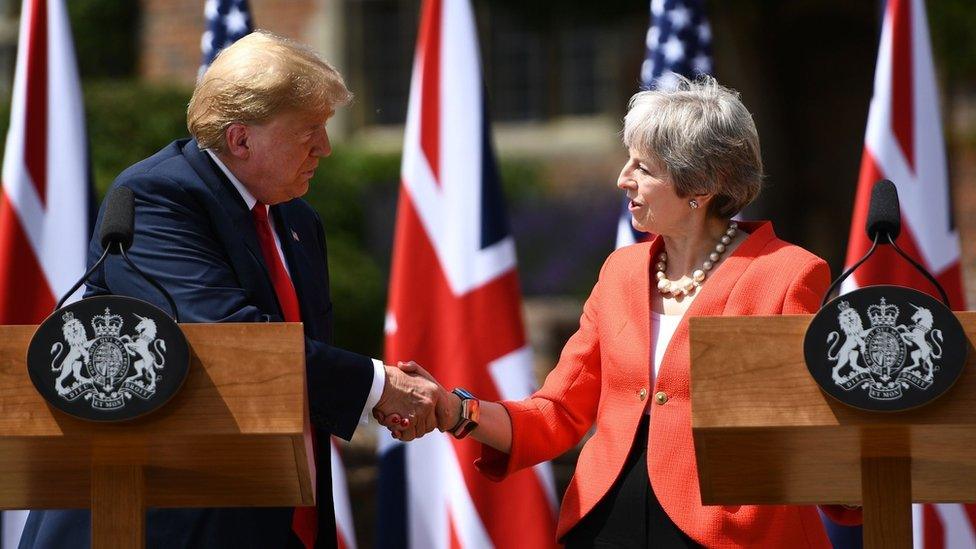
This week's visit is scheduled to include a joint news conference with Theresa May, something the pair did when he came to the UK last July
Mr Trump had already expressed his support for Nigel Farage, saying the leader of the newly-formed Brexit Party was his friend, a "big power" in the UK and someone for whom he had a lot of respect. Will Mr Trump find time to meet Mr Farage?
Downing Street has rejected the idea of there being an official meeting between the two, but might there be time for a quick cup of tea at Winfield House, the London residence of the US ambassador? Neither side are ruling it out.
One minister told me this would be seen as both disappointing and rude. But Mr Trump rarely misses a chance to associate with like-minded politicians, if nothing else to emphasise what he sees as the growing success of his kind of politics.
He will not mind that the two main opposition party leaders - Jeremy Corbyn and Sir Vince Cable - have refused their invitations to dine with him at the state banquet.
Conservative leadership
Mr Trump also arrives in the middle of the Conservative leadership contest that will determine the next prime minister of the United Kingdom.
He has already backed one candidate, the front-runner, Boris Johnson. The president told The Sun the former foreign secretary would be an excellent prime minister who would do "a very good job".
On one hand, there will be some Conservative MPs and party members who will be impressed by this, welcoming the idea that a potential future prime minister already has a good relationship with a close ally.
On the other, there may be some MPs who believe the unofficial endorsement from an unpopular US president might not endear Mr Johnson to the wider British electorate, which has more mixed feelings about Mr Trump.
Trump: I like Boris Johnson and Nigel Farage
Remember that Mr Trump has already backed Mr Johnson, saying when he was in the UK last year that Mr Johnson - a former US citizen - would make "a great prime minister".
Equally interesting would be any remarks Mr Trump chooses to make about the Labour leader, Mr Corbyn, who could one day be the person he meets for lunch in Downing Street, a leader who has made no secret of his hostility towards many US policies.
Mr Trump told The Sun he was "not offended" by Mr Corbyn's refusal to attend the state banquet, saying: "He is probably making a mistake because I think he would want to get along with the United States."
Middle East
In a visit focused on ceremony and talks with an outgoing prime minister, the opportunity to discuss substantive policy will be, by necessity, constrained.
But there will be much to disagree about in a trip that is supposed to emphasise unity.
Take, for example, the Middle East. The British and US disagree about how best to change Iran's behaviour - the UK still supports the agreement designed to curb Tehran's nuclear programme, the US does not and is ready to sanction any British firm or bank that trades with Iran.
The US has deployed a carrier strike force and B52 bombers to the region, something some British diplomats fear could provoke escalation, even war.
Are these differences something Mr Trump will wish to raise in public?
The president will also bring with him his adviser and son-in-law, Jared Kushner, who is expected soon to announce the US so-called "deal of the century" to try to resolve the conflict between Israel and the Palestinians.
The British government is concerned about any attempt to impose a unilateral plan that disposes of the two-state solution and seeks to buy off the Palestinians with hard cash.
The Americans have already made it clear they are willing to press ahead without European support, just so long as they have the backing of one or two Arab states.
Will any tough talking in Downing Street spill over into the news conference that follows?
China
Let us not forget China. The growing confrontation between the US and China is worrying British policymakers, not just because of the potential impact on global economic growth.
But there is also the not so minor matter of Huawei. The US is already angry at the decision - yet to be finalised - by British ministers to consider allowing the Chinese telecoms giant to build part of the UK's 5G mobile network.
They fear this would potentially give the Chinese state access - via Huawei - to British and thus American secrets.
US officials are warning that Mr Trump will not only raise this during the state visit but may even threaten to limit sharing intelligence with the UK as a result.
Just consider what that might mean: the so-called "special relationship" has always had as a central core the sharing of intelligence - a relationship between security professionals that is supposed to be eternal, outside the squalls of political disagreement.
So it would be hard for the president to praise UK-US relations while at the same time threatening to withhold intelligence.
US officials say they are reassured that the UK decision on Huawei is not final and on hold until a new prime minister is elected. But they cannot rule out strong words on the subject from their president.
Mr Trump, of course, once suggested that UK intelligence agencies were involved in a plot against his election - something they dismissed publicly as ridiculous nonsense.
- Published4 June 2019
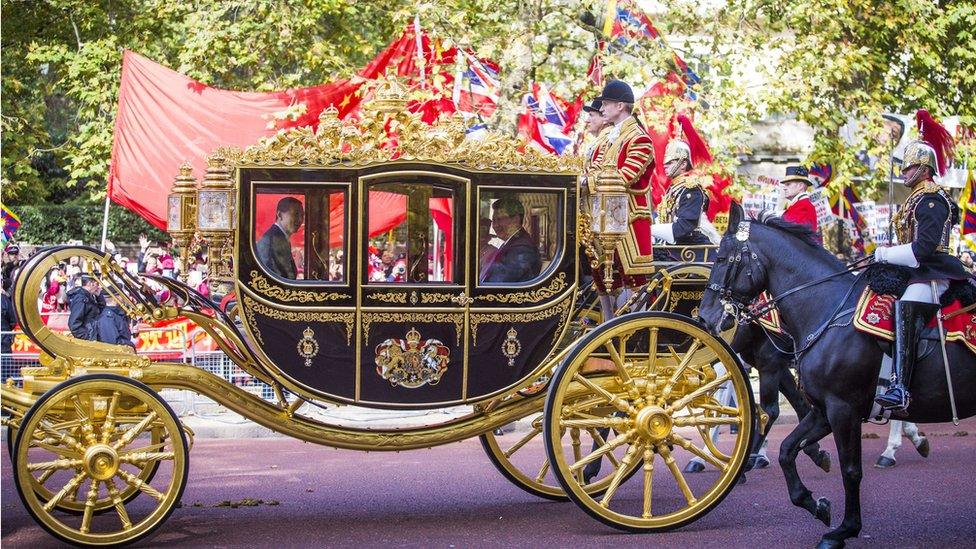
- Published2 December 2019
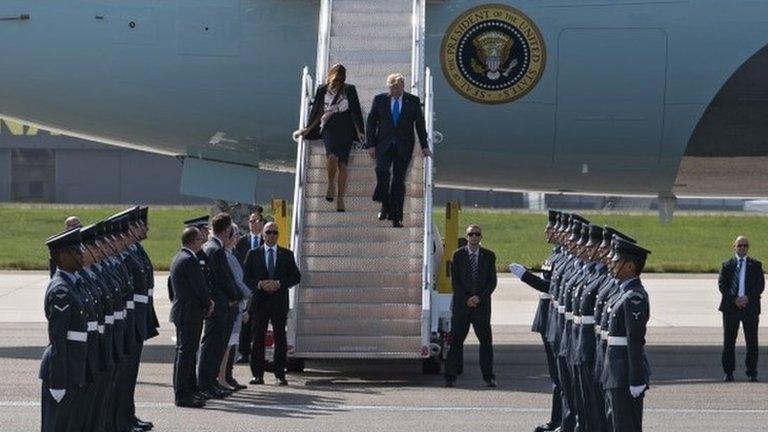
- Published23 April 2019

- Published23 April 2019
